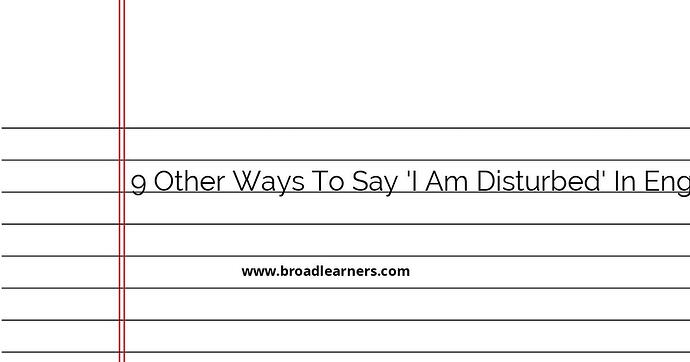Feeling disturbed is a common experience that we all go through at some point in our lives. However, instead of using the same phrase 'I am disturbed' every time, it is beneficial to have a range of alternative expressions that can convey your feelings more effectively. Here are 9 other ways to say 'I am disturbed' in English:
- I am troubled
- I am unsettled
- I am bothered
- I am perturbed
- I am disconcerted
- I am agitated
- I am unnerved
- I am distressed
- I am disquieted
Let's explore each alternative in detail:
1. I am troubled
Using 'I am troubled' indicates that something is causing you distress or concern. It suggests a deeper level of unease or worry.
Example: 'The recent events in the news have left me deeply troubled.'
2. I am unsettled
If you feel uneasy or disturbed by a situation or event, you can say 'I am unsettled.' It conveys a sense of being emotionally or mentally disturbed.
Example: 'The sudden change in plans has left me feeling unsettled.'
3. I am bothered
'I am bothered' expresses a sense of annoyance or irritation. It indicates that something is causing you discomfort or uneasiness.
Example: 'The constant noise from the construction site is really bothering me.'
4. I am perturbed
When you are deeply disturbed or troubled by something, you can use the word 'perturbed.' It suggests a sense of being mentally or emotionally unsettled.
Example: 'The lack of response from my friend has left me feeling perturbed.'
5. I am disconcerted
'I am disconcerted' conveys a feeling of being confused or thrown off balance. It suggests being disturbed by something unexpected or surprising.
Example: 'The sudden change in his behavior has left me feeling disconcerted.'
6. I am agitated
If you are feeling restless, anxious, or disturbed, you can use the word 'agitated.' It implies a sense of inner turmoil or unease.
Example: 'The constant deadlines and workload are making me feel agitated.'
7. I am unnerved
When you are deeply affected or disturbed by something to the point of losing your composure or confidence, you can say 'I am unnerved.'
Example: 'The ghost stories told around the campfire unnerved me.'
8. I am distressed
'I am distressed' indicates a feeling of extreme sadness, worry, or discomfort. It suggests being emotionally troubled or upset.
Example: 'The news of the accident has left me deeply distressed.'
9. I am disquieted
If something is causing you a sense of unease or restlessness, you can say 'I am disquieted.' It implies a feeling of being disturbed or troubled.
Example: 'The eerie silence in the empty house left me feeling disquieted.'
Using these alternative expressions will help you effectively communicate your sense of disturbance or unease in various situations. Remember to choose the expression that best captures your emotions and use it appropriately.
Did I miss anything? Respond below
